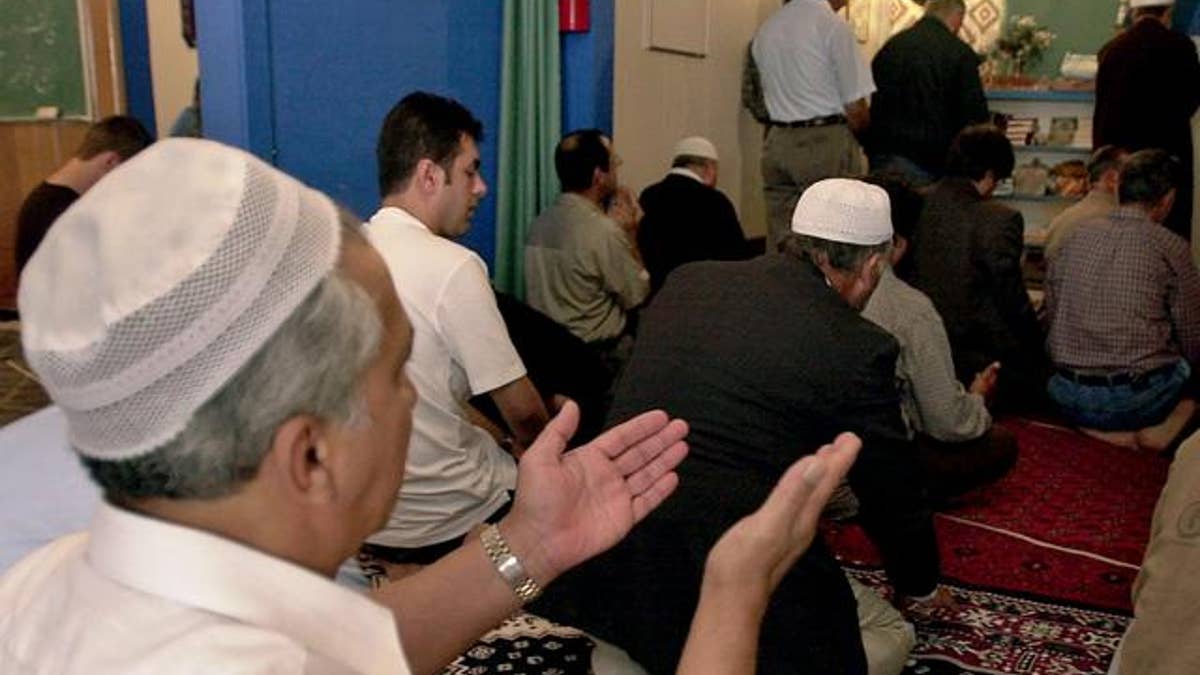
The U.S. Christian community is divided over whether or not to allow Muslims to use their churches as prayer space -- something that two Protestant churches have already done. (AP)
They see it as their Christian duty. But others disagree, saying it extends the hand of fellowship where it was never intended to go.
Two Protestant churches are taking some heat from critics for opening their church buildings to Muslims needing places to worship because their own facilities were either too small, or under construction.
Heartsong Church in Cordova, Tenn., let members of the Memphis Islamic Center hold Ramadan prayers there last September. And Aldersgate United Methodist Church in Alexandria, Va., allows the Islamic Circle of North America to hold regular Friday prayers in their building while their new mosque is being built.
Diane Bechtol of Aldersgate says this is something Christians are called to do: Be neighborly and develop relationships - even those who don't share your beliefs.
"I think it's a tenet of our Christian faith, and that is that we extend hospitality to the stranger,” said Bechtol. “We are a congregation that wants to be helpful to people and if we are asked to help a neighbor in need, that's what we do."
But Dr. Alex McFarland, a Christian theologian and radio talk show host, charged these churches “have crossed the line from respect and tolerance, to ... affirmation and endorsement.
"We as the church are called to show love, we're called to help. But to let a building simultaneously be used for the activities of a mosque and also the activities of Jesus Christ, it's just incompatible. And I think it's one more example of political correctness and hyper-tolerance gone awry."
Mohamed Elsanousi adamantly disagrees, saying it’s good for the country to know churches like these are extending a hand to Muslims.
Elsanousi is National Community Outreach Director of the Islamic Society of North America. He says "allowing people the freedom of worship is respectful and strengthens the relationship."
Elsanousi says there are many churches and even synagogues in America where Muslims share space with Christians. “We feel good about it,” he says.
That trend may continue as the Muslim population across the U.S. continues to grow.
Mosque construction is at an all-time high. As of September, there were 1,897 mosques in the United States, a 57 percent increase since 2000.
Several of those building projects have caused friction with local communities. According to the Pew Forum, there are 35 proposed Mosques and Islamic centers that have encountered resistance. The most prominent, the Ground Zero mosque, is just two blocks from the World Trade Center site.
Dr. Jason Hood, an Evangelical theologian, says there are other ways Christians can share the love of Christ without building a bridge too far. "Caring for Muslim refugees is particularly important,” he says, along with "sharing meals and recreational opportunities."
Heartsong's relationship with its Muslim neighbors has developed into an annual Thanksgiving meal between the two faiths, and the use of a joint 15-acre community park.
Steve Stone, Heartsong's senior pastor, wrote in Christianity Today that "No thought at all was given to the political ramifications … The decision was firmly based only on our understanding of the mission and nature of the church." He also pointed out that "there was no trading of theologies. They are Muslims; we are Jesus followers; both of us are clear about that."
But McFarland says it's good to remember the "political ramifications" of Muslim-Christian interaction.
"What if we went to Muslims and said 'Hey, can we use your mosque for the worship of Jesus, the incarnate son of God, the one that said 'no one comes to the Father but through him.' I doubt there would be a lot of reciprocity’."
McFarland says the groups run the risk of creating something called “Chrislam” - a combination of the two faiths that essentially ignores the big white elephant in the room: the exclusive claims of both Christianity and Islam.









































